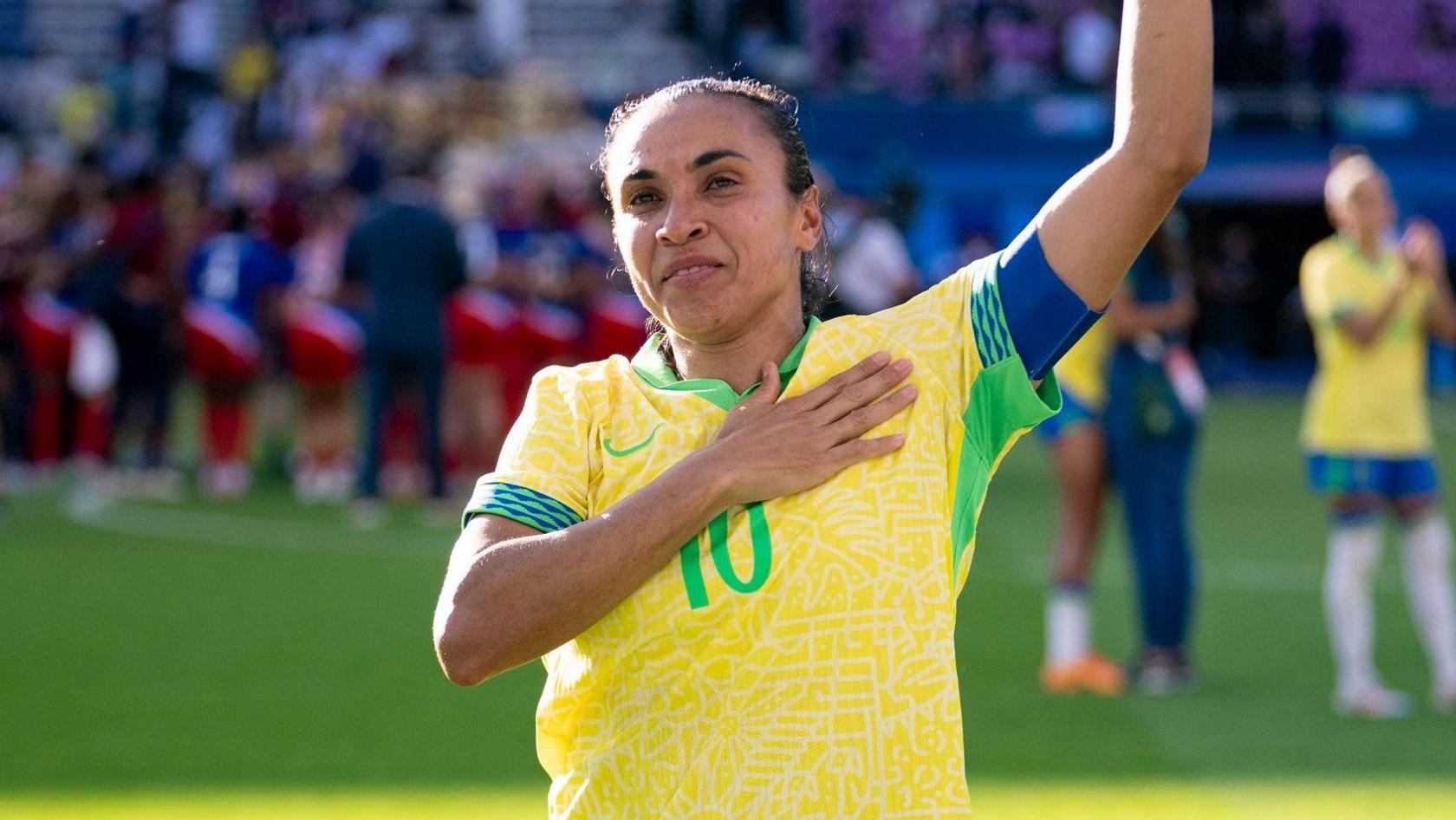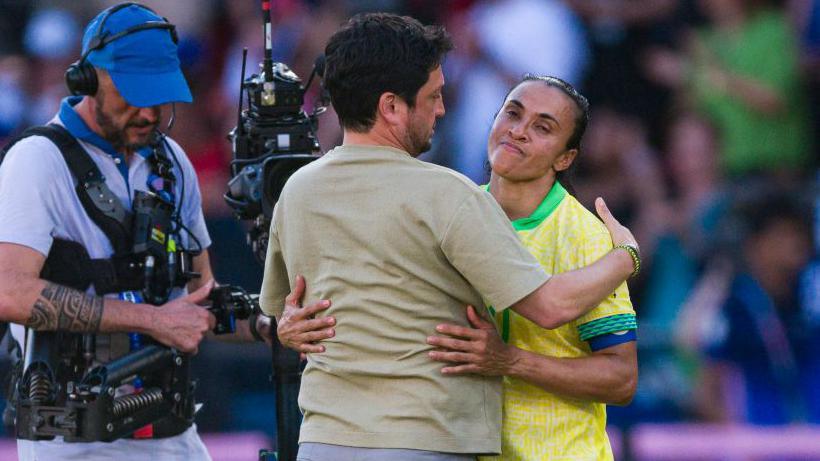Brazil's 'queen' Marta unlikely to play for country again

Marta has represented Brazil at six Olympics
- Published
Brazil's all-time leading goalscorer Marta said she has likely played her last game for her country.
The 38-year-old announced in April that she plans to retire from international football this year, but there had been speculation she might play on until the 2027 World Cup, hosted by Brazil.
Orlando Pride forward Marta said Saturday's 1-0 defeat by the United States in the Paris 2024 gold medal match was her last "in the Olympics and probably in official competition".
"I don't think you will see me again at the World Cup," she added.
Marta leaves with three Olympic silver medals after three defeats by the USA in 2004, 2008 and 2024.
She has never won a major international trophy with Brazil, but goes down as "the best in history" according to Brazil boss Arthur Elias.
"We are all very proud of our national team and our number 10, our queen, Marta," he added.

Marta is the all-time leading scorer in World Cups, men's or women's, with 17 goals in 23 appearances across six tournaments
Marta's Olympics in Paris looked to have ended in bitter disappointment when she was sent off in tears for a dangerous tackle in a group-stage defeat by Spain.
The straight red card came with a two-match ban, meaning Marta missed matches against France and Spain en route to Saturday's final.
Though she was given the chance for a farewell appearance, Marta couldn't make an impact as a second-half substitute against Emma Hayes' USA.
Elias said his embrace with Marta at the full-time whistle was a "goodbye hug", but she plans to stick around in some capacity.
"I am not going to disappear from football," she said. "I am going to try to contribute somehow to this generation, because they are very talented girls and are well aware of what we can achieve.
"I have spent more than 20 years doing what I love most, and playing a sport that was not always seen as being for women.
"Now we can say that it is one of the most followed sports. Someone had to start that process, so I feel very proud to have contributed and participated in some way so that today people talk much more about women's football."
Watch highlights as Emma Hayes leads US to Olympic gold beating Brazil in first competiton
'No exaggeration to talk of Marta in same breath as Pele'
Tim Vickery, South American football writer
The first cut is so often the deepest.
Football may produce better players than Pele, and may even already have done so. But there can never be another Pele.
The great Brazilian helped drag the game into the TV age and did more than anyone else to transform the World Cup into the biggest sporting event on the planet. No-one can ever take that away from Pele - and it is not the slightest exaggeration to say we can talk of Marta in the same breath.
Marta, who said Brazil's defeat to the United States in the Olympic Games final on Saturday was probably her last international, has been a great exponent of her sport.
But more profound than this is the undeniable fact that she has done more than anyone else to 'legitimise' women's football, to weaken and overcome resistance to the game, to accelerate its development, to serve as an example for millions of girls all around the world.
Now 38, she is clearly well past her best. Statistics clearly show that it is some time since she has been able to tip the balance as she did in her prime years, gliding past opponents with embarrassing ease, humiliating goalkeepers with shots from all angles.
By the time that she reached her physical peak, dominating would become a little more difficult for Marta.
Certainly for a fair while, this had nothing to do with any decline on Marta's part. Rather, it was a symptom of the growth of the game, the rapidly rising physical and technical standards. This growth was her achievement.
In a way, Marta became a victim of her own success, and we are all reaping the benefits of the changes that she helped bring about.
- Published1 August 2023
There was a time when she appeared to be playing a different sport from her opponents. Now, many more players from a range of different countries are worthy of sharing a pitch with the great Marta.
Sometimes destiny can choose the most unlikely people to shake the world. Marta comes from a small town in the remote North Eastern state of Alagoas.
Born into a poor family in a macho environment, she had to overcome resistance from her own family in order to take up football - a sport which had been banned for women for decades in Brazil, and which has only recently offered the slightest chance of a career path.
There were brave pioneers before her, many of whom laboured and sacrificed away for no reward and little time in the spotlight. But she took on the challenge and raised the game to heights that her predecessors could scarcely have dreamed were possible.
Marta is the giant on whose shoulders the contemporary women's game stands.
And this, supposedly, is the end. Or is it?
In 2027, Brazil will host the Women's World Cup. There must be a temptation to stay on for one last crack, to spend a little time in the house that she built.
Related topics
- Published10 August 2024

- Published26 July 2024

